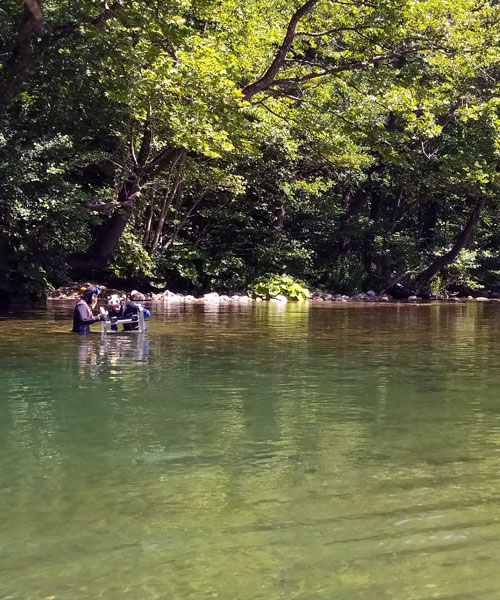Estimation of Environmental Flows using Unmanned Aerial Vehicles and Acoustic Equipment based on fish habitat requirements

Human interventions to the natural streamflow regime are rising, without most of the time taking into account the environmental water needs.
Environmental water is the amount of water required to sustain freshwater and estuarine ecosystems and the human livelihood that depends on these ecosystems. Ηydromorphological pressures alter the natural flow regime of rivers and can be directly linked to impacts on their physical and chemical attributes and processes.
The environmental flow regime is a key element in determining river processes, affecting ecosystem health.
There is an urgent need to develop sustainable environmental flow management guidelines to mitigate the risk associated with alterations to the flow regime. Α great majority of water supply planners worldwide have already begun to address the water needs of river ecosystems by reserving some portion of river flows for ecosystem support.
Priority should be given to better address over-abstraction of water,
the second most common pressure on European Union ecological status, and to recognize that water quality and quantity are intimately related within the concept of ‘good status’. In several cases, overly simplistic “rules of thumb”, such as minimum flow standards, have been adopted for defining allowable degrees of hydrologic modification, based on the legislative framework of each country. Although these methods provide general guidelines to the policy makers, they still do not provide a sufficient framework, which can ensure the biological integrity of the river ecosystems.
Short History
The major research need for this project is stimulated by the fact that there is limited experience regarding estimation of environmental flow regimes worldwide, apart from minimum ecological flow thresholds.
Regarding Greek rivers, the impacts on aquatic ecosystems from flow regulation by dams constructed especially before 1995, are major and in several cases irreversible due to the absence of suitable ecological flow provisions. No sooner than 2008, Greek legislation establishes minimum ecological flow standards, focusing especially on the outflow of small hydropower plants (Official Journal of the Hellenic Republic 2464B/2008), without addressing the requirements of aquatic communities, apart from an extra rule introduced in 2011 (Official Journal of the Hellenic Republic 518B/2011), relative to ichthyofauna which is under a special conservation status. Integrating environmental flows in the Greek water management poses a challenge for the years to come, particularly considering that these flows still have not contemplated for all the Greek River Basin Management Plans as an environmental demand, but as an environmental restriction to water use.
Project originality
In FlowTech a cutting edge technology for the estimation of fish habitat criteria, using Unmanned Aerial System (UAS), comprised by a fixed-wing airplane and high resolution RGB cameras,
will contribute to physical habitat identification through the development of detailed Digital Terrain Models (DTMs) by applying photogrammetric techniques.
Moreover, an Unmanned Vessel will be constructed that will host acoustic technologies for depth and velocity measurements based on the fish locations, combined with a Real-time kinematic (RTK) positioning system. For the identification of the fish species, a camera will be also attached in the Unmanned Vessel. Substrate data will be also collected. Moreover, techniques which have traditionally been used (i.e. snorkeling, electrofishing) for fish habitat measurements (Papadaki et al., 2016; Heggenes and Saltveit, 1990; Martínez-Capel et al., 2009) will be also applied for validation.
Aims
The primary aim of this project
is to develop hydroecological modelling tools and habitat suitability models using state-of-the-art technology, for estimating aquatic habitats’ water requirements that will take into consideration both the ecosystem functions and services as well as improved water management practices for environmental flows estimation. Moreover, the project actions will facilitate the implementation of the relevant legislation including the Water Framework Directive – 2000/60/EC.
Flowtech will harvest and upgrade the existing knowledge and experience focusing on the estimation of environmental water needs in a more integrated way, regardless of policy restrictions.
More specifically a Physical Habitat Simulation Approach for fish species will be applied in Greek rivers by developing fish Habitat Suitability Curves and hydrodynamic models,incorporating state of the art technology with the main objective to achieve fast, repeatable and highly accurate results for the data collection regarding the fish habitat measurements.
Expected results & Research Project Impact
Under the framework of this project, progress will be reported on the environmental flows with prospect to contribute most effectively to sustainable freshwater management on a country level.
It is also expected to broaden the relative audience including water resources managers, decision makers, scientists working in the fields of ecology and water resources management, engineers that design hydraulic works and environmental policy makers, Non-governmental organizations in the fields of Environment, public administrators in the water permits offices, researchers and students working on aquatic sciences to embrace social-ecological sustainability that balances freshwater conservation needs with human well-being.
Funding
The FlowTech project is funded under the 2st Call for Research Projects ELIDEK (HFRI, Hellenic Foundation for Research and Innovation) for the support of Post-doctoral Researchers by the General Secretariat of Research and Technology (GSRT) within the scientific research area for the Environment and Energy (Project ID: 454).
